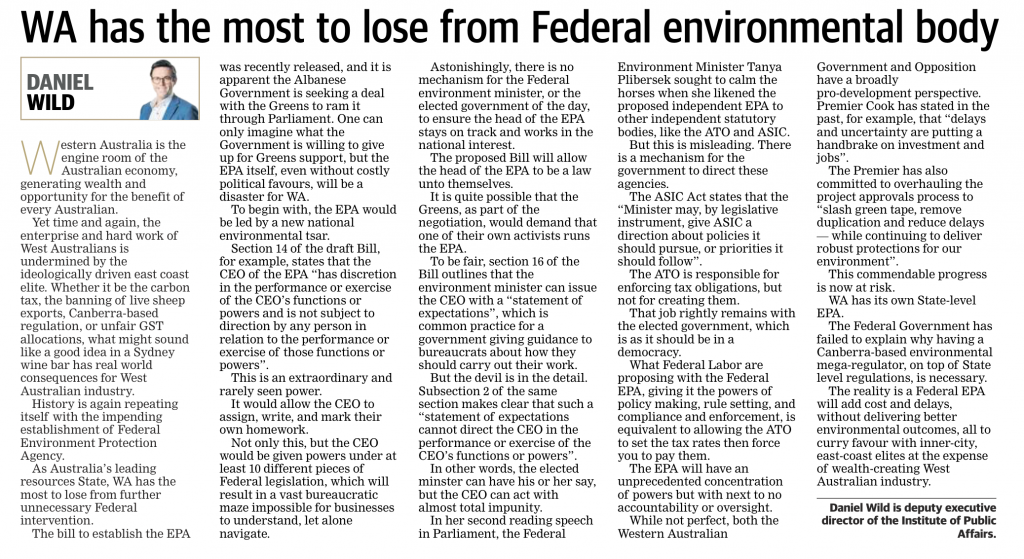

Western Australia is the engine room of the Australian economy, generating wealth and opportunity for the benefit of every Australian.
Yet time and again, the enterprise and hard work of West Australians is undermined by the ideologically driven east coast elite.
Whether it be the carbon tax, the banning of live sheep exports, Canberra-based regulation, or unfair GST allocations, what might sound like a good idea in a Sydney wine bar has real world consequences for West Australian industry.
History is again repeating itself with the impending establishment of Federal Environment Protection Agency. As Australia’s leading resources State, WA has the most to lose from further unnecessary Federal intervention.
The bill to establish the EPA was recently released, and it is apparent the Albanese Government is seeking a deal with the Greens to ram it through Parliament.
One can only imagine what the Government is willing to give up for Greens support, but the EPA itself, even without costly political favours, will be a disaster for WA.
To begin with, the EPA would be led by a new national environmental tsar.
Section 14 of the draft Bill, for example, states that the CEO of the EPA “has discretion in the performance or exercise of the CEO’s functions or powers and is not subject to direction by any person in relation to the performance or exercise of those functions or powers”.
This is an extraordinary and rarely seen power. It would allow the CEO to assign, write, and mark their own homework. Not only this, but the CEO would be given powers under at least 10 different pieces of federal legislation, which will result in a vast bureaucratic maze impossible for businesses to understand, let alone navigate.
Astonishingly, there is no mechanism for the Federal environment minister, or the elected government of the day, to ensure the head of the EPA stays on track and works in the national interest. The proposed Bill will allow the head of the EPA to be a law unto themselves.
It is quite possible that the Greens, as part of the negotiation, would demand that one of their own activists runs the EPA.
To be fair, section 16 of the Bill outlines that the environment minister can issue the CEO with a “statement of expectations”, which is common practice for a government giving guidance to bureaucrats about how they should carry out their work.
But the devil is in the detail. Subsection 2 of the same section makes clear that such a “statement of expectations cannot direct the CEO in the performance or exercise of the CEO’s functions or powers”. In other words, the elected minister can have his or her say, but the CEO can act with almost total impunity.
In her second reading speech in Parliament, the Federal Environment Minister Tanya Plibersek sought to calm the horses when she likened the proposed independent EPA to other independent statutory bodies, like the ATO and ASIC.
But this is misleading. There is a mechanism for the government to direct these agencies.
The ASIC Act states that the “Minister may, by legislative instrument, give ASIC a direction about policies it should pursue, or priorities it should follow”.
The ATO is responsible for enforcing tax obligations, but not for creating them. That job rightly remains with the elected government, which is as it should be in a democracy.
What Federal Labor is proposing with the federal EPA, giving it the powers of policy-making, rule setting, and compliance and enforcement, is equivalent to allowing the ATO to set the tax rates then force you to pay them.
The EPA will have an unprecedented concentration of powers but with next to no accountability or oversight.
While not perfect, both the Western Australian Government and Opposition have a broadly pro-development perspective. Premier Cook has stated in the past, for example, that “delays and uncertainty are putting a handbrake on investment and jobs”.
The Premier has also committed to overhauling the project approvals process to “slash green tape, remove duplication and reduce delays — while continuing to deliver robust protections for our environment”.
This commendable progress is now at risk. WA has its own State-level EPA. The Federal Government has failed to explain why having a Canberra-based environmental mega-regulator, on top of State level regulations, is necessary.
The reality is a federal EPA will add cost and delays, without delivering better environmental outcomes, all to curry favour with inner-city, east-coast elites at the expense of wealth-creating West Australian industry.
Daniel Wild is deputy executive director of the Institute of Public Affairs.